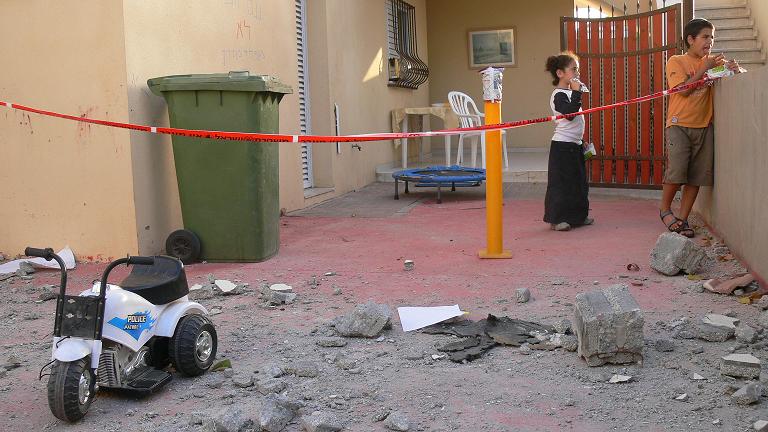Hamas officials said that a 52-page document has been compiled to testify that the offensive missiles fired during Operation Cast lead were “an accident” due to their weapon’s lack of aiming capabilities toward military installations.
However, section 1687 of the “Goldstone Report” presents that, “indeed, Palestinian armed groups, among them Hamas, have publicly expressed their intention to target Israel civilians…. claimed responsibility for the deaths of each of the Israeli civilians killed by rocket fired during the operations in Gaza”.
Destruction after a rocket targeting the civilians of Sderot. (Photo: Noam Bedein/Sderot Media Center)
This begs the question: If Hamas weapon’s suffer from inaccuracy, maybe the information that was given to Goldstone is also off target?
I remember the first time that I heard about Sapir college was when I was traveling in the United States after the army. When I asked about the whereabouts of the college, a friend replied, “It is a nice place next to Sderot. However, the situation is a little strange. Rockets are launched towards the city daily”. I did not know what lay ahead for me at Sapir College, but I decided that I would take the risk. After all, I figured something would be done, eventually, to stop the rockets.
Eight years have passed since the first rocket was launched towards Sderot. The situation has not changed, I was wrong. More than ten thousand kassam missiles, grad, and mortar shells have been fired from Gaza, of which eighty-four fell in Sderot during Operation Cast Lead. Moreover, the “military installations” Hamas speaks of are nowhere to be found in the city. Where exactly were the rockets intended to fall?
I have witnessed firsthand the “mistakes” that have not only produced several deaths, but continue to affect hundreds, if not a thousands, of people with Post-Traumatic Stress Disorder (PSD) as a result of the constant threat of incoming rocket attacks to the city.
What has been the result of the poor aiming capabilities of Hamas rockets?
As a student in Sderot, I awoke every morning to begin the usual routine of my day. However, my routine was not morning coffee and a newspaper. My routine, drenched with fear, caution, and preparation for the next rocket aimed towards my city, was different than the average student from other areas of the world.
Like clockwork, I was awoken at the same time, with the same target hit, and with the same color red alarm. This alarm notified me that I had only 15 seconds to take cover of my life. As I ran to the nearest bomb shelter, I passed the same children on their way to school. Once inside the crammed shelter, I heard the whistle.
That whistle of a rocket falling to my direction quickly became an all too familiar sound. Maybe this time the rocket will fall in my neighborhood? Maybe this time it will land in the home of someone that I know?
While waiting in a bomb shelter, praying for safety, the fire continued. It was not one rocket, or one “mistake”, that came to my direction. Many mistakes were fired towards me through the city. According to the Sderot Media Center, “Palestinian rockets directly hit more than 1,500 Israeli homes and buildings in the south. Three synagogues were hit, in addition to nine educational facilities, which include high schools, kindergartens, and elementary schools.”
Can these cases actually be a malfunction in Hamas’ original plan?
After a day full of color red alarms, or after three weeks of 140 alarms during the Operation, the residents of Sderot and myself gathered to listen to the news. We heard about the mistakes that hit our loved one’s homes, the mistakes that kept children from going to school the next day, and the mistakes that are expected to continue.
As a student and as a resident, we had to use our nights to recover from our day. There was homework to be done, relationships to build, our homes that we needed to continue to keep alive. We had to continue to live. However, our nights were full of their mistakes as well, for the nightly news had the highest Sderot ratings, and Hamas chose without fail to use that time for mistakes as well.
Maybe I shouldn’t complain, for if Hamas had indeed aimed correctly, the extent of the destruction, the mental disorders, the loss of hope would be far greater. With that, I must say I have luck.












Completely agree with the points Itzik is making in this article. He brings up a good point in regards to what Hamas is actually telling the goldstone report.